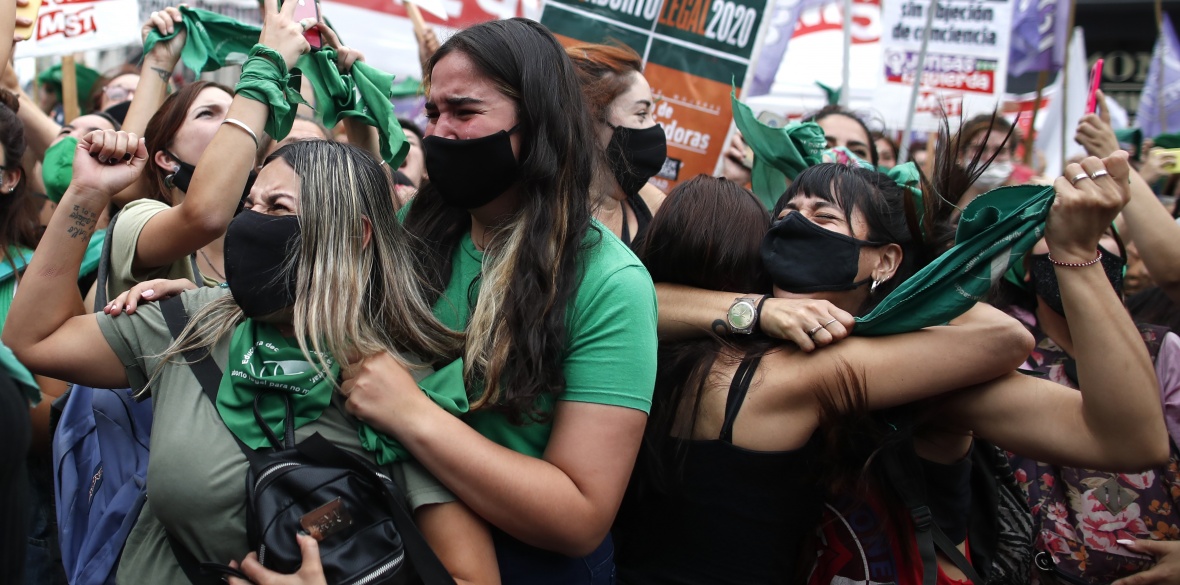Abortion activists in the streets of Buenos Aires, Argentina jumped for joy Friday at the prospect of being able to legally kill their unborn babies in elective, unnecessary abortions.
The sickening display of “deep joy and emotion” occurred after an early morning vote by the Argentine lower house to legalize abortions up to 14 weeks of pregnancy, Euro News reports.
Abortion activist, backed by some of the richest men in the world, hope that if they convince Argentina to abandon its protections for unborn babies, other South American countries will follow its example. Most countries on the content protect unborn babies’ right to life.
The AP reports the legislation, introduced by President Alberto Fernandez, passed at 7 a.m. Friday after 20 hours of debate. It now move to the Argentine Senate where pro-lifers hope lawmakers will reject it as they did a similar pro-abortion bill in 2018.
Follow LifeNews on the MeWe social media network for the latest pro-life news free from Facebook’s censorship!
The bill would allow unborn babies to be aborted for any reason up to 14 weeks of pregnancy and later in cases of rape or dangers to the mother’s life or health. It would allow girls over 13 to get secret abortions without their parents’ knowledge or consent and could force medical providers to either abort unborn babies or refer women to someone else who will.
Pro-abortion groups celebrated the vote Friday as a “historic moment,” according to the Morning Star, a British socialist news outlet.
“I’m so excited. It is a historic demand, and it has to do with solving a public health problem,” pro-abortion campaigner Laura Salome said, according to the report.
But abortions are not health care, and they are not necessary for women to be healthy or prosperous. The purpose of an abortion is to kill an unborn baby. Abortions can pose serious, sometimes deadly, risks to mothers as well.
Outside the Argentine congress, thousands of pro-life and pro-abortion protesters gathered to hear the results of the vote. A video from Euro News showed abortion activists jumping up and down and waving green scarves, a symbol of the pro-abortion movement, after the vote was announced. Many of them sang and hugged each other, while some cried tears of “joy,” according to the video footage.
Inside the house, pro-abortion lawmakers also waved green flags, shouted and hugged one another. An AP report noted that many of the abortion activists did not seem “to care about the social distancing imposed to combat the coronavirus pandemic.”
Agustina Felice, of the National Campaign for the Right to Abortion, said the vote brought her “deep joy and emotion” after their 15-year fight to legalize abortions, according to the report.
Meanwhile, news reports described how pro-lifers cried and hung their heads in sorrow in the streets of Buenos Aires after they learned of the vote to legalize the killing of unborn babies.
The people of Argentina strongly oppose abortions, and many hope that the Argentine Senate will reject the pro-abortion bill.
The pro-life coalition Unidad Provida encouraged people to protest against the radical pro-abortion bill.
“With a combination of anger at the president’s contempt for life and enthusiasm for the trust given in the overwhelming strength of #LaMayoríaCeleste [the pro-life movement], pro-lifers will go to the streets to demand the rejection of the abortion law,” the pro-life coalition said.
Unidad Provida also urged lawmakers to drop the bill and enact policies that support “the care of the two lives that are at stake in a vulnerable pregnancy” instead.
In 2019, approximately 2 million Argentines participated in the country’s March for Life. Thousands more protested in March after Fernandez first announced his plans to legalize abortion on demand.
A similar proposal to legalize the killing of unborn babies in Argentina failed in 2018 because of strong public opposition.








